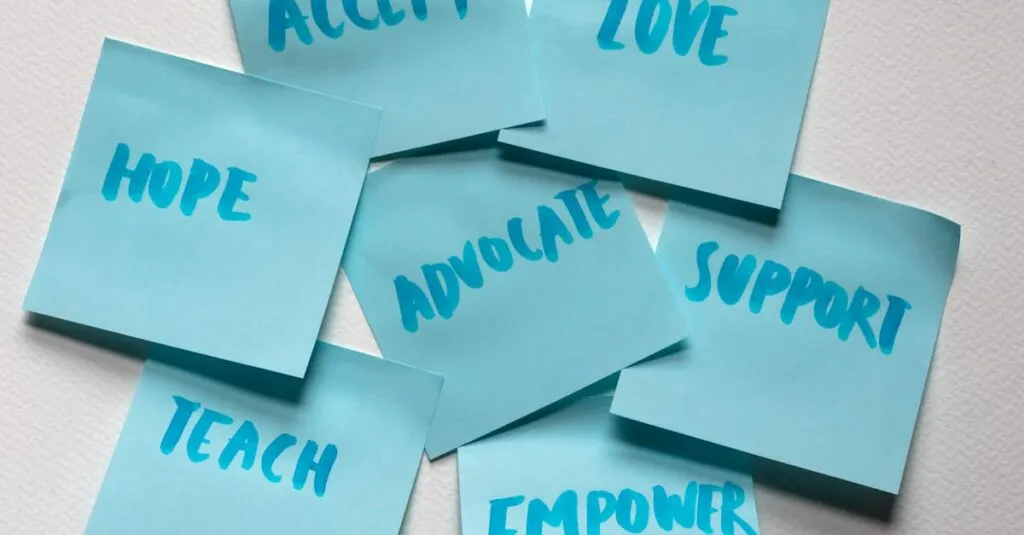In a world where adulting often feels like a never-ending cycle of bills and responsibilities, embracing a growth mindset can be the secret sauce to transforming challenges into opportunities. Forget about the idea that your brain’s set in stone; it’s more like Play-Doh—malleable and ready to be shaped! With the right activities, anyone can unlock their potential and turn “I can’t” into “Watch me!”
Table of Contents
ToggleUnderstanding Growth Mindset
A growth mindset empowers adults to embrace challenges and view failures as growth opportunities. This outlook is essential for personal and professional development.
Definition and Importance
A growth mindset, often defined as the belief in the brain’s ability to adapt and improve, emphasizes that intelligence and skills can develop through dedication and hard work. This perspective is crucial, as it fosters resilience in the face of obstacles. Individuals with a growth mindset understand that effort leads to mastery and are more open to new experiences. Adopting this viewpoint cultivates a culture of continuous learning, enabling adults to navigate life’s complexities with confidence.
Benefits of a Growth Mindset
Benefits abound for those who cultivate a growth mindset. Individuals experience increased motivation, which drives them to tackle challenges head-on. Enhanced problem-solving skills emerge as they learn to view setbacks as learning experiences. Relationships often improve, too, as collaboration and open communication flourish in an environment where growth is encouraged. Additionally, adults with this mindset report higher levels of satisfaction in their personal and professional lives, leading to overall well-being.
Types of Growth Mindset Activities
Engaging in specific types of activities enhances the adoption of a growth mindset in adults. These activities target various aspects, encouraging personal development and resilience.
Reflective Practices
Reflective practices foster deeper self-awareness. Journaling facilitates exploration of thoughts and feelings, providing clarity on experiences. Group discussions generate feedback, helping individuals see different perspectives. Regular mindfulness exercises promote focus and the ability to learn from setbacks. Through consistent self-reflection, individuals gain insights that encourage adaptability and growth.
Skill Development Exercises
Skill development exercises promote continuous learning and improvement. Attending workshops offers hands-on experience that expands capabilities. Online courses allow for flexible learning, catering to various interests and schedules. Setting personal challenges encourages individuals to step outside their comfort zones and enhance skills. Practicing new techniques regularly reinforces the belief that abilities can grow through dedication and effort.
Collaborative Learning Experiences
Collaborative learning experiences harness the power of teamwork. Joining study groups fosters accountability and shared learning goals, encouraging motivation from peers. Engaging in community projects connects individuals with diverse skill sets, enhancing collaboration. Participating in mentorship programs allows adults to learn from others’ experiences while sharing their knowledge. These interactions build a supportive environment that amplifies personal and collective growth.
Implementing Growth Mindset Activities
Engaging in growth mindset activities enhances personal and professional growth. Applying various strategies can significantly impact overall mindset transformation.
Setting Goals
Establishing clear goals drives motivation and fosters a sense of direction. Individuals should create specific, measurable, achievable, relevant, and time-bound (SMART) goals. Focusing on incremental progress helps maintain momentum. For example, someone aiming to learn a new skill might set aside 30 minutes daily for practice. Established benchmarks allow for reflection on achievements and areas needing improvement. Tracking progress cultivates accountability and reinforces the belief in one’s ability to grow.
Creating a Supportive Environment
Building a supportive environment enhances growth mindset activities. Surrounding oneself with positive influences encourages resilience and collaboration. Engaging with like-minded individuals creates opportunities for sharing experiences and learning from one another. For instance, participating in discussion groups or workshops fosters a sense of belonging and collaboration. Additionally, providing constructive feedback and celebrating successes boosts confidence. Individuals thrive when they receive encouragement, making it essential to cultivate relationships that nurture development.
Measuring Progress
Measuring progress in adopting a growth mindset involves using effective techniques and systems to monitor development.
Self-Assessment Techniques
Self-assessment tools enable individuals to evaluate their mindset shifts. Reflective journaling offers insights into thoughts and behaviors, facilitating self-awareness. Adults can use online assessments to quantify their growth, comparing initial and current mindsets. Goal-setting checklists aid in tracking achievements, helping individuals visualize progress over time. Regular self-assessment promotes accountability and highlights areas for improvement.
Feedback Mechanisms
Feedback mechanisms play a crucial role in personal development. Seeking constructive criticism from peers, mentors, or supervisors encourages open communication. Structured feedback sessions provide actionable insights, guiding future efforts effectively. Regular check-ins help maintain motivation and build resilience, reinforcing growth mindset principles. Celebrating milestones through feedback reinforces positive changes and fosters confidence in continuous learning.
Embracing a growth mindset can significantly impact an adult’s life by transforming challenges into opportunities for growth. Engaging in targeted activities not only enhances personal and professional development but also fosters resilience and adaptability. By setting clear goals and creating a supportive environment, individuals can cultivate a mindset that thrives on learning and collaboration.
The journey toward a growth mindset requires consistent effort and reflection, but the rewards are profound. Increased motivation improved relationships and a more fulfilling life await those who commit to this transformative approach. As adults actively engage in these practices, they unlock their potential and pave the way for a brighter future.






